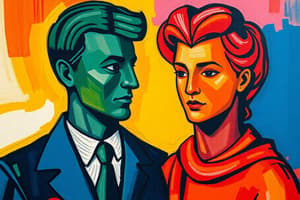Podcast
Questions and Answers
What does the term 'social contract' refer to?
What does the term 'social contract' refer to?
- A framework for economic policies
- A contract between the people and their government (correct)
- An international treaty
- A legal agreement between businesses
Which ideology emphasizes individual interests over community needs?
Which ideology emphasizes individual interests over community needs?
- Socialism
- Libertarianism (correct)
- Collectivism
- Fascism
Which concept is characterized by the belief in minimal government interference in personal lives?
Which concept is characterized by the belief in minimal government interference in personal lives?
- Libertarianism (correct)
- Humanism
- Monarchy
- Welfare
What type of government is characterized by a single ruler holding power through hereditary succession?
What type of government is characterized by a single ruler holding power through hereditary succession?
What does the term 'pluralism' promote in a society?
What does the term 'pluralism' promote in a society?
Which ideology is derived from Karl Marx and advocates class war?
Which ideology is derived from Karl Marx and advocates class war?
What is the main focus of socialism as an ideology?
What is the main focus of socialism as an ideology?
Which of the following best describes 'fascism'?
Which of the following best describes 'fascism'?
What political philosophy advocates for social reform and addresses issues such as inequality?
What political philosophy advocates for social reform and addresses issues such as inequality?
Which term refers to a government belief in actively interfering in social or economic affairs?
Which term refers to a government belief in actively interfering in social or economic affairs?
What best describes the political system where a single leader holds concentrated power?
What best describes the political system where a single leader holds concentrated power?
What ideology emphasizes individual rights and minimal government intervention?
What ideology emphasizes individual rights and minimal government intervention?
Which belief centers around the idea that society should adhere to traditional institutions?
Which belief centers around the idea that society should adhere to traditional institutions?
How did John Locke view human nature compared to Thomas Hobbes?
How did John Locke view human nature compared to Thomas Hobbes?
What economic system involves private individuals owning and controlling businesses?
What economic system involves private individuals owning and controlling businesses?
What does the term 'secular' imply in governance?
What does the term 'secular' imply in governance?
Flashcards are hidden until you start studying
Study Notes
Terminology
- Divine Right of Kings: Monarchs believed to derive authority directly from God, legitimizing royal power as divinely ordained.
- Libertarian: Advocates for minimal government intervention in both markets and personal lives, prioritizing individual freedoms.
- Pluralism: Promotes and accepts diversity within society, encouraging multiple perspectives and identities.
- Welfare: Refers to the overall health, happiness, and fortunes of individuals or groups within a society.
- Social Contract: Conceptually outlines the agreement between citizens and government, establishing mutual obligations.
- Liberal: Supports progressive policies aimed at enhancing social welfare and equality within society.
- Communism: Based on Marxist theory, envisions a classless society with collective ownership of property and production.
- Humanism: Philosophical approach focusing on human values and interests, emphasizing reason and ethics.
- Non-Interventionist: Advocates for minimal interference in foreign affairs, promoting a hands-off approach to international relations.
- Monarchy: Governance where a singular ruler holds power, typically passed down through hereditary lines.
- Collectivist: Ideology prioritizing group interests over individual needs, advocating cooperative ownership and decision-making.
- Republican: Advocates governance as a public matter with elected representation and civic involvement.
- Socialist: Endorses social ownership means of production, aiming to reduce inequality and fulfill basic societal needs collectively.
- Ideology: A comprehensive set of beliefs guiding individual or group political, social, and economic views.
- Revolutionary: Supports significant changes in social or political structures, often through radical actions.
- Fascism: Totalitarian ideology characterized by nationalism, authoritarian leadership, and suppression of dissent.
- Progressivism: Political philosophy focused on social reforms addressing inequality and advancing societal modernization.
- Interventionist: Proposes active government engagement in economic and social issues both domestically and globally.
- Authoritarian: Concentration of power in a single leader or small group, limiting individual freedoms and democratic practices.
- Individualist: Emphasizes personal rights and freedoms, advocating for minimal state intervention in life and economy.
- Democrat: Champion of democracy, valuing elected representation and protection of individual rights.
- Capitalism: Economic system dominated by private ownership and market forces, minimizing government control.
- Conservative: Favors traditional values and institutions, advocating limited government interference and cautious change.
- Reactionary: Seeks to revert to previous societal norms, resisting progressive reforms and preserving traditional ideologies.
- Renaissance: Cultural revival in Europe emphasizing classical art, literature, and learning, significantly influencing modern thought.
- Secular: Supports the separation of religion from state affairs, promoting governance based on rational, secular principles.
Classical Thinkers
- Thomas Hobbes*
- Human Nature: Believed humans are inherently selfish and violent, leading to poor decision-making.
- Ideal Government: Advocated for an absolute monarchy to maintain order and control among reckless individuals.
- John Locke*
- Human Nature: Argued that individuals possess natural rights—life, liberty, and property—and are rational beings.
- Ideal Government: Proposed that governments should safeguard these natural rights, ensuring protection for citizens.
Studying That Suits You
Use AI to generate personalized quizzes and flashcards to suit your learning preferences.




